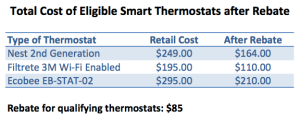In late April Austin Energy announced that customers participating in a new smart thermostat program would be eligible to receive an $85 rebate on qualifying thermostats. The new rebate program is similar to the Power Saver program, which provided free programmable thermostats to customers in exchange for allowing Austin Energy to remotely cycle the thermostats during periods of peak electricity demand.
One of the goals of the new program is to further reduce peak demand during the summer months, which Austin Energy said has already been reduced by up to 40 megawatts through the free thermostat program [1]. In exchange for the $85 rebate, Austin Energy retains the ability to remotely cycle on and off the new smart thermostats in participating households from 4 p.m. to 6 p.m. for 10-15 days during the hottest months.
The program covers three smart thermostats, including options from Nest, Filtrete and Ecobee. Below is a cost comparison chart of the different thermostats based on the retail prices on www.amazon.com, as of May 4, 2013 [2].
These programmable smart thermostats allow consumers to access and manage home heating and cooling controls from a computer or mobile device, although certain models require additional equipment in order to obtain these benefits. According Austin Energy, the thermostats can help households reduce cooling and heating bills by up to 20 percent. Some research has also shown that smart thermostats can improve overall temperature control and extend the lifetime of heating and cooling equipment in the home [3]
However, other studies have shown that installing smart thermostats does not lead to consumer savings, particularly for households that are already energy conscious consumers [4]. Given that Austin Energy consumers must opt-in to the new smart thermostat rebate program—and that some of those consumers are already energy conscious consumers—it may not lead to significant savings for most households.
Sources
[1] Austin Energy. Accessed May 2, 2013. http://www.austinenergy.com/About%20Us/Newsroom/Press%20Releases/2013/smartThermostatProgram.htm
[2] Austin Energy.
[3] Saha, A., M. Kuzlu, and M. Pipattanasomporn. “Demonstration of a home energy management system with smart thermostat control.” In Innovative Smart Grid Technologies (ISGT), 2013 IEEE PES, pp. 1-8. IEEE, 2013.
[4] Surles, William, and Gregor P. Henze. “Evaluation of automatic priced based thermostat control for peak energy reduction under residential time-of-use utility tariffs.” Energy and Buildings 49 (2012): 99-108.


This is one of the reasons I think Austin’s so cool. They’re willing to roll out rebate programs, composting programs, etc. etc. in order to see what will actually work, and to collect some hard data that will be really beneficial in the near future. There are some things that will be a benefit to us in the end, but there has to be some willingness to try it out first. Personally, I’d really like to be able to access my thermostat from my phone or computer. As an energy conscious consumer, there are still those days that I accidentally forget to turn off my AC or heater before I leave the house, and so being able to program it and manage it remotely would be great. The peak shifting idea is pretty cool too in terms of reducing overall energy use, but I’m curious how bummed out people get when they can’t control their thermostat on those really hot days.
There are a few things I could see that could potentially be negative aspects about this too. The first one is that I could see some people using the remote programming to turn on their heating or cooling systems on their way home, so that their house is at the perfect temperature when they arrive. Would it end up being less efficient because of this? The other thing that always concerns me about management tools like this is opening up the possibility for hacking and that kind of thing. But I haven’t actually read to much in to it, so they may be tackling this already.
Thanks for the article!